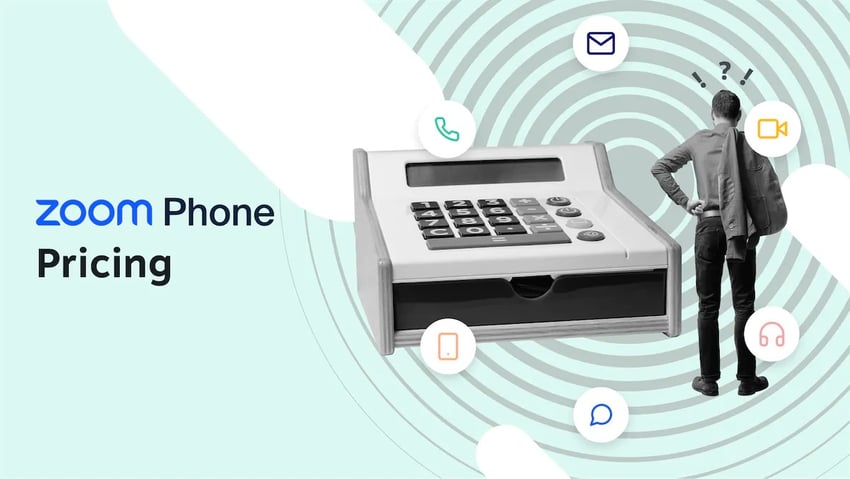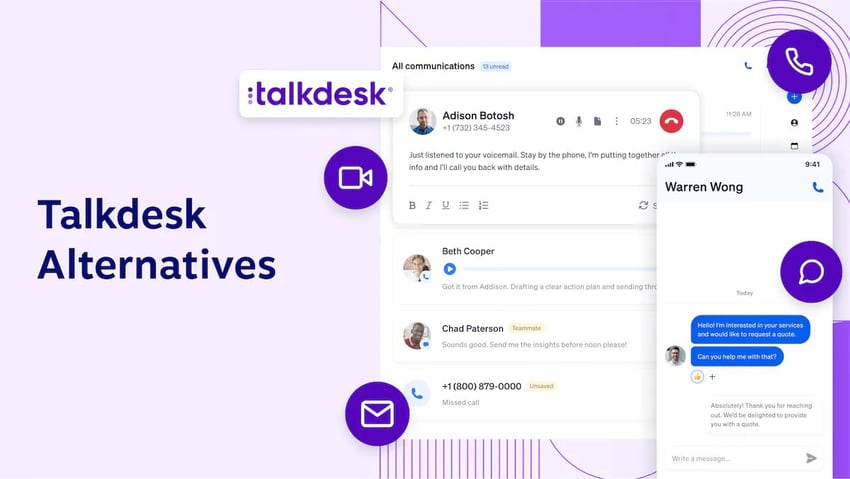The Mitel communications platform will shut down after June 24, 2026. The clock is ticking until MiCloud ceases to exist. Whether you’re a Mitel customer facing this shutdown or a business seeking a stable cloud VoIP solution, you’re in the right place.
The most critical deadline is fast approaching: you must select a new communications provider by January 1, 2026, to ensure a smooth transition before the service is terminated permanently.
Failing to act soon puts you at serious risk of service interruptions, a chaotic migration, or worse — losing your business phone numbers entirely before the platform’s End of Life (EoL). This guide will help you navigate this urgent choice, highlighting the top Mitel alternatives for a successful transition away from the sunsetting platform.
What Is Mitel, and Why Is There an Urgent Need to Switch?
Mitel, a long-standing name in telecommunications, shifted its cloud strategy in 2021 by partnering with RingCentral. This resulted in RingCentral acquiring the MiCloud Connect platform and its customers. Now, that platform is officially heading to its End of Life.
While Mitel continues to sell and maintain its on-premise and private cloud solutions (like MiVoice Business and MiContact Center) for businesses that manage their own infrastructure, its public cloud UCaaS strategy has changed. This strategic pivot leaves its cloud customers in need of a new service.
RingCentral is no longer investing in the platform and has set a final disconnection date of June 24th, 2026. This isn’t just a simple software update. If your organization relies upon Mitel, you need to take action.
Key Deadlines for MiCloud Customers
The migration process is complex and time-sensitive.

According to RingCentral, customers need to act long before the final shutdown date to avoid service disruptions:
- Select your new solution: Deadline: January 1st, 2026
- Start the phone number porting process: Deadline: January 1st, 2026
- Submit account termination request: Deadline: April 30, 2026
- Complete all porting: Deadline: June 1st, 2026
The biggest risk is the number porting process, which RingCentral warns can take up to 6 weeks or longer, especially for accounts with over 100 numbers. Waiting too long could mean a period with no inbound or outbound calling capabilities, which is a disaster for any business.
Other factors driving the search for Mitel’s alternatives include:
- A shift away from cloud communications: Mitel’s primary focus is now on its on-premise and private cloud customers, with deep specializations in industries like hospitality, healthcare, and manufacturing that often require legacy hardware integrations. Businesses that need a multi-tenant cloud provider with rapid feature development and cloud-native innovation must now look to alternatives whose entire business model is built on the cloud.
- Data loss risk: All call recordings must be manually downloaded before the EoL date, or they will be permanently lost. This requires a proactive plan and a new provider that can securely store your data.
- Forced migration: Businesses prefer to choose their provider based on features, value, and service. This EoL event allows you to proactively select the best long-term partner, rather than being forced into a default migration path.
Top Mitel Competitors You Should Now Consider
To help you quickly compare the top choices, we’ve broken down five solutions by the features most critical for a business migrating from Mitel. The focus here is not just on price, but on reliability, key functionality, and suitability for managing a time-sensitive transition.
| Provider | Starting price* | Best for | Standout feature | Uptime SLA (approx.) | Migration support |
| Nextiva | $15 | Businesses of all sizes that need a unified, reliable, cost-effective, and fast support solution. | Unified communications platform (voice, video, chat, CX, AI features) and excellent customer support | 99.999% | Excellent |
| Dialpad | $15 | Teams focused on AI and automation. | Real-time AI transcription and call summaries | 99.99% (higher-tier plans) | Good |
| GoTo Connect | Contact sales | SMBs that heavily use video conferencing. | Integration with GoTo Meeting | 99.999% | Good |
| Phone.com | $15 | Small, budget-conscious businesses. | Flexible mix-and-match user plans | Not publicly listed | Standard |
| Grasshopper | $14 | Solopreneurs looking for a business phone number. | Virtual phone number that forwards to mobile | N/A | Basic |
Key takeaways from the comparison:
As our research shows, while several providers offer competitive starting prices, the differences are more pronounced in terms of reliability and support.
- For a high-stakes migration, an uptime Service Level Agreement (SLA) is critical. Nextiva and GoTo Connect lead with a carrier-grade 99.999% uptime.
- For pure simplicity, Grasshopper is an option, but it’s not a true UCaaS system and isn’t suitable for replacing a multi-user Mitel setup.
- For future-proofing, Nextiva features a complete, unified platform that includes customer experience (CX) tools and offers high scalability for your communications system across your entire organization, not just your phone needs. Its excellent rating for migration support reflects the provider’s focus on working with businesses to ensure a smooth and risk-free transition.
1. Nextiva
Best alternative for a seamless Mitel transition with superior unified communications features.
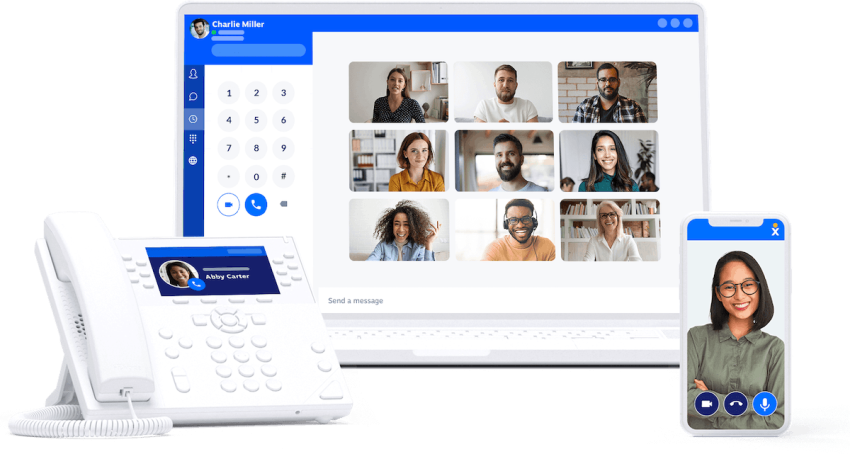
For businesses migrating from Mitel, Nextiva stands out as the top alternative. It offers a reliable, feature-rich cloud-based phone system and unified communications platform and, crucially, has a great track record of handling complex migrations with its award-winning support team.
What are some of its top features?
- Expert onboarding and porting: Nextiva’s dedicated team manages the entire number porting process, making your transition smooth, meeting tight deadlines, and minimizing the risk of service disruptions.
- Unified communications platform: Transition from a discontinued product to an innovative, actively developed UCaaS platform that combines voice, video, team chat, SMS, and customer experience tools.
- High reliability: Striving for a 99.999% availability with a carrier-grade network, you can be confident that your communications are secure and available at all times.
- Visual call flow builder: Easily replicate or enhance your Mitel call routing with an intuitive drag-and-drop editor — no IT expertise required.
- Ease-of-use: Nextiva’s user-friendly interface optimizes the user experience, offering clear navigation views, automated workflows, and simple telephony functionality.

A reliable uptime SLA, a carrier-grade network, flexible pricing plans, powerful calling, messaging, and analytics capabilities, and industry-leading security and compliance with SOC 2, PCI, HIPAA, and GDPR, make Nextiva a top Mitel alternative for modern business communication needs.
Nextiva pricing plans
Nextiva offers simple pricing plans with powerful functionality. You can choose from these plans based on your needs:
- Core: Starts at $15/user/month with unlimited voice/video calling, auto attendant, business SMS, and key integrations.
- Engage: Starts at $25/user/month, adding call recording, a toll-free number, advanced reporting, and customer-to-team SMS.
- Power Suite CX: Starts at $75/user/month, offering a complete omnichannel contact center with voice and web chat, AI transcription, and intelligent routing.
Best for: Businesses of all sizes that need a reliable, future-proof cloud communications partner to manage their migration from Mitel MiCloud Connect without disrupting operations.
2. Grasshopper
For solopreneurs and small teams
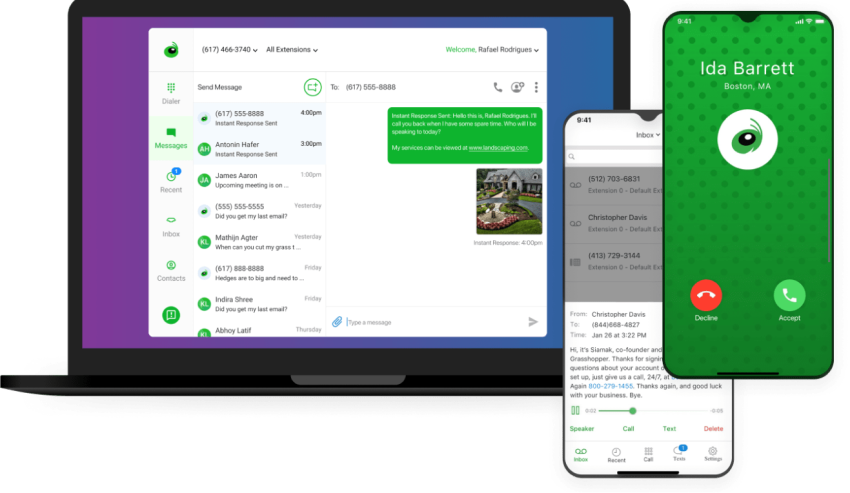
Grasshopper is a feature-rich virtual phone system built for small and growing businesses. It allows entrepreneurs and small teams to have a dedicated business phone number that routes calls to their cell phones or landlines.
What are some of its top features?
Grasshopper offers a range of features that support busy small business owners, including:
- Virtual assistants to take calls, screen messages, and direct callers.
- Essential VoIP features like call forwarding, auto-attendant, voicemail transcription, and conference calling to handle incoming and outgoing calls.
- A mobile app that allows you to manage calls, access voicemails, and stay connected with your team from anywhere.
Grasshopper pricing plans
Pricing tiers based on extensions needed:
- True Solo at $14/month provides one phone number and extension for a single user.
- Solo Plus at $25/month offers unlimited users, one phone number, and up to three extensions.
- Small Business at $55/month offers unlimited users, four phone numbers, and unlimited extensions.
Best for: Grasshopper is an affordable and full-featured business phone solution for solopreneurs and small teams.
3. GoToConnect
For integrated UC and video meetings
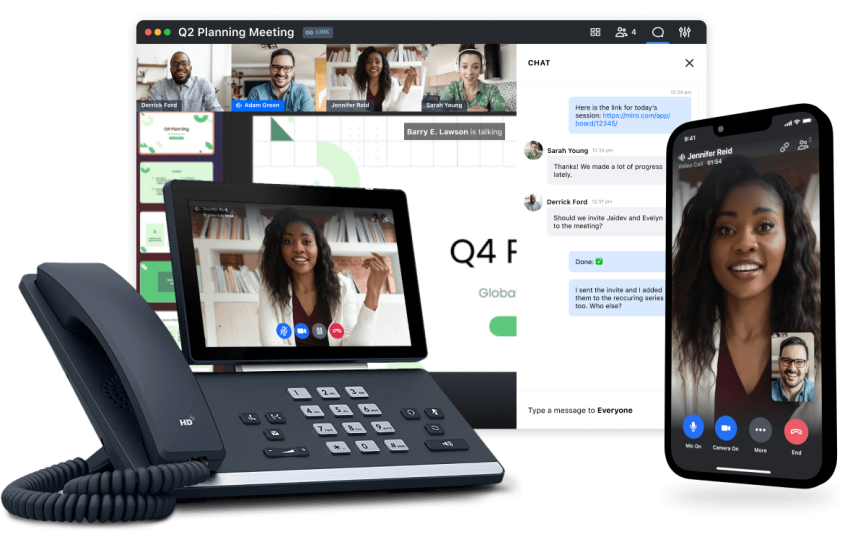
GoTo Connect, formerly known as Jive, is a cloud-based phone and meetings platform owned by LogMeIn. It integrates seamlessly with other LogMeIn products like GoToMeeting and GoToWebinar.
What are some of its top features?
GoTo Connect offers phone, meetings, messaging, and support center features, including:
- Call flows: A visual dial plan editor you can use to build different patterns for after-hour calls, weekends, and holidays.
- Audio conferencing: Run audio conference calls with numbers from over 30 countries, either over VoIP or by dialing into meetings.
- Call analytics: Analyze call patterns by time, length, issue, day of the week, and location to maximize agent availability and productivity.
GoTo Connect pricing plans
GoTo Connect offers three main pricing plans: Phone system, Connect CX, and Contact Center. You need to talk to GoTo’s sales team to get the specific pricing details.
Best for: GoToConnect is ideal for growing teams that want an integrated business communication suite with strong security and reliability.
4. Dialpad
For AI-powered communications

Dialpad is an AI-powered cloud communication platform that unifies voice, video, messaging, and contact center features. It’s designed for agile teams that need to connect and collaborate from anywhere.
What are some of its top features?
Dialpad offers advanced communication features across voice, video, messages, and online meetings. Some of these features include:
- Automatic call distributor: Use routing rules and interactive voice response (IVR) to answer calls efficiently.
- Business phone app: Work from anywhere with a softphone you can use on smartphones to make and receive calls, check voicemail, and more.
- Voice intelligence: Automate note-taking and detect customer sentiments with built-in machine learning, voice recognition, and natural language processing.
Dialpad pricing plans
Dialpad offers three pricing tiers:
- Standard at $15 per user/month with unlimited calling, messaging, transcriptions, integrations, analytics, and web/chat support.
- Pro at $25 per user/month adds on 24/7 live support, CRM integrations, global SMS, and open APIs.
- Custom enterprise pricing for large teams includes unlimited extensions, SSO, data retention policies, and priority support.
Best for: Dialpad focuses more on intelligent features for the modern and mobile workforce. It works best for businesses needing more AI capabilities.
5. Phone.com
Affordable and scalable for SMBs

Phone.com is a feature-rich VoIP platform for agile, distributed teams across the US. It delivers voice, video, SMS, and fax capabilities.
What are some of its top features?
Phone.com offers 50+ features to streamline communications. These features include:
- Audio conferencing: Host large HD voice conferences with up to 300 global participants.
- Fax from phone: Upload and fax documents right from your computer with one click. Saves time and paper.
- Voice tagging: Call routing menus tag each caller selection so agents have context and deliver personalized service.
Phone.com pricing plans
Phone.com comes in three pricing options:
- Basic at $15/user/month with unlimited minutes, one phone number per account, video conferences for up to 100 participants, and a mobile app.
- Plus plan at $22.50/user/month offers AI-Connect Answering, IP desk phone compatibility, business text messaging, and voicemail transcription.
- Pro at $33.33/user/month offers call recording, analytics, CRM integration, and 10-year data retention.
Best for: Phone.com is an affordable, full-featured VoIP provider that scales well for SMBs with remote/hybrid workforces.
6. Aircall
Cloud call center for SMBs
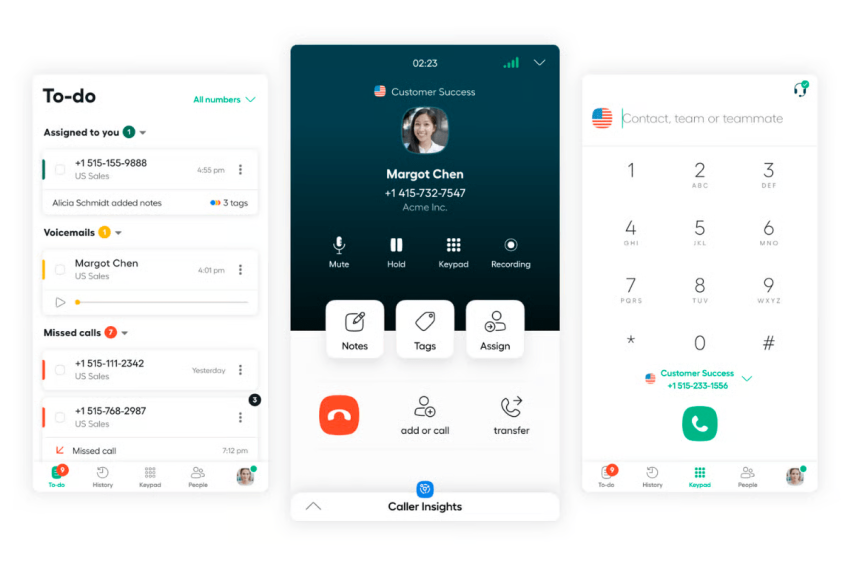
Aircall is a cloud-based call center software designed for sales, support, and non-profit teams.
What are some of its top features?
Aircall offers advanced telephony, collaboration tools, a call center, productivity, and analytics features, including:
- Queue callback: Let your callers opt out of waiting in a call queue and receive a call from you at a later time.
- Shared contacts: Agents can access real-time customer data and call history to personalize interactions.
- CRM integrations: Integrate with your CRM and helpdesk tools to keep all conversations throughout the customer journey connected.
Aircall pricing plans
Aircall offers two standard pricing plans and an option to get a customized package, but you must have at least three users. (You’ll spend at least $1,080 yearly)
- Essentials is a basic plan starting at $30/license/month, purchased for at least three users. Includes unlimited inbound calls (toll-free excluded), unlimited domestic calls, IVR, call recording, and softphones for desktop, Android, and iOS.
- Professional plan starts at $50/license/month for the same number of users. All features of the Essentials plus Salesforce integration, mandatory call tagging, advanced analytics and call monitoring, queue call-back, and power dialer for sales teams.
Best for: Aircall combines essential call center tools for small businesses. The onboarding assistance also simplifies transitioning from legacy systems like Avaya or Mitel. Ideal for fast-growing SMBs.
7. 8×8
For international calling needs

8×8 is a platform for cloud-native contact centers, voice, team chat, meetings, and embeddable communications.
What are some of its top features?
8×8 offers a range of call management, productivity, and admin features in its cloud PBX solution. These include:
- Multi-level auto-attendants: Provide intelligent self-service options based on various caller attributes to resolve issues quickly.
- Visual voicemail: Transcribe and deliver voicemails as text for easier processing.
- Mobile apps: Unified mobile experience for voice, video meetings, chat, and fax.
8×8 pricing plans
8×8 pricing offers custom quotes across four tiers: Contact Center, CX Beyond the Contact Center, Communications APIs, and Unified Communications. You’ll need to speak to its sales team to request a custom quote, as prices are not publicly listed on the website.
Best for: 8×8 empowers modern, mobile contact centers with continuity of customer and employee experience across engagement channels. Global compliance coverage facilitates international deployments.
8. OnSIP
For remote and hybrid teams
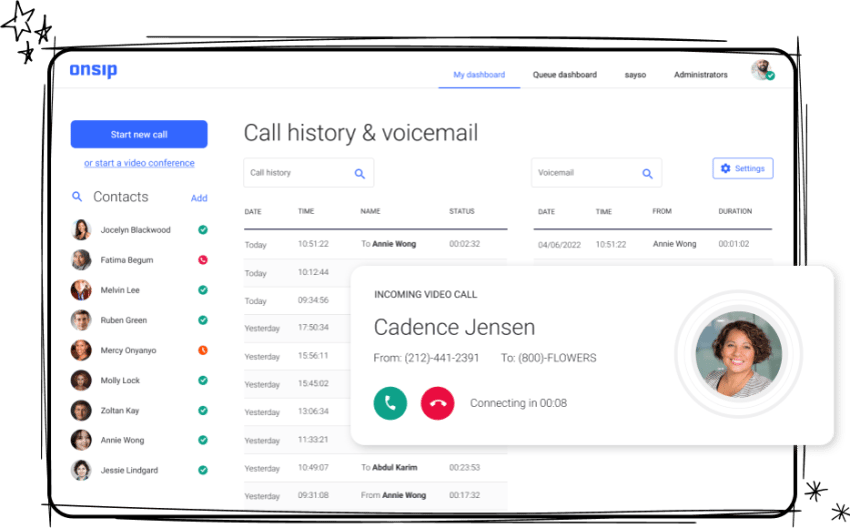
OnSIP offers a cloud-based VoIP phone system tailored for remote teams.
It’s a complete phone system replacement with traditional phone system features like conference bridges, voicemail management, and HD voice calls — both on your desktop and smartphone.
What are some of its top features?
OnSIP’s features are lean and straightforward, including:
- Sayso website chat: Make voice/video calls directly through the company website. Integrates with HubSpot.
- Mobile app: Make and receive calls via softphone on smartphones/desktops with HD call quality.
- Video conferencing: Host online meetings with screen sharing for up to 5 participants.
OnSIP pricing plans
OnSIP offers two main plans:
- Unlimited: Starts at $18.95 per user per month, with a minimum of 5 users. Includes unlimited auto attendants, call recording, and voicemail.
- Basic: For lower call volume, and starts at $49.95 per month per account. Calling minutes are not included in this plan and are billed at 3.2¢/min.
Best for: OnSIP facilitates seamless communication and collaboration for today’s remote-first teams with excellent reliability, security, and support.
9. Ooma
Strong at residential phone service
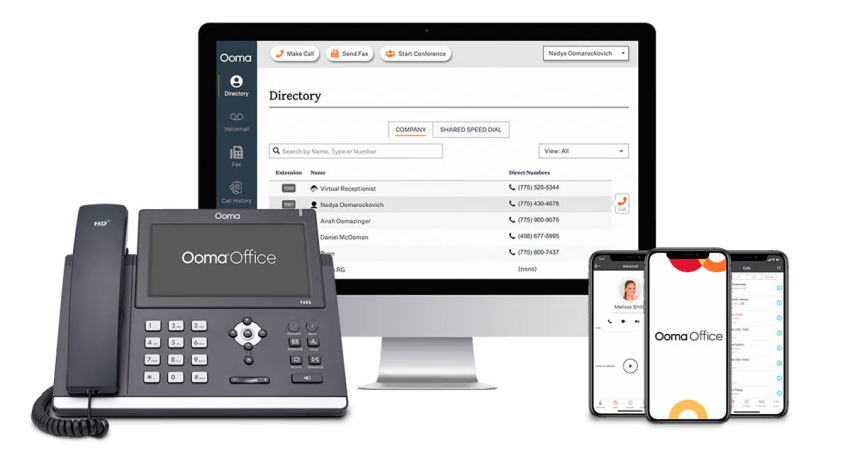
Ooma is a business phone service made for small businesses that need a reliable, flexible phone system. Its plans and features are tailored to businesses working remotely so you can keep a separate business line, hear clear audio, and work efficiently.
What are some of its top features?
Ooma Office provides more than 50 standard features, including:
- Multi-ring: Route calls simultaneously to multiple devices like desk phones and smartphones. Ensures anytime connectivity.
- Virtual receptionist: Customizable auto-attendant provides call routing, business hours, and other information to callers.
- Voicemail transcription: Voicemails can be received via email as audio files or automated transcripts.
Ooma pricing plans
Ooma is available in three service plans:
- Essentials at $19.95 per user/month offers calling in the US/Canada/Mexico/Puerto Rico, a virtual receptionist, and mobile apps.
- Pro at $24.95 per user/month adds desktop apps, texting, video conferences for 25 participants, and call recording.
- Pro Plus at $29.95 includes CRM integration, larger 100-participant video conferences, hot desking, and call queuing.
10. Zoom Phone
For Zoom ecosystem users
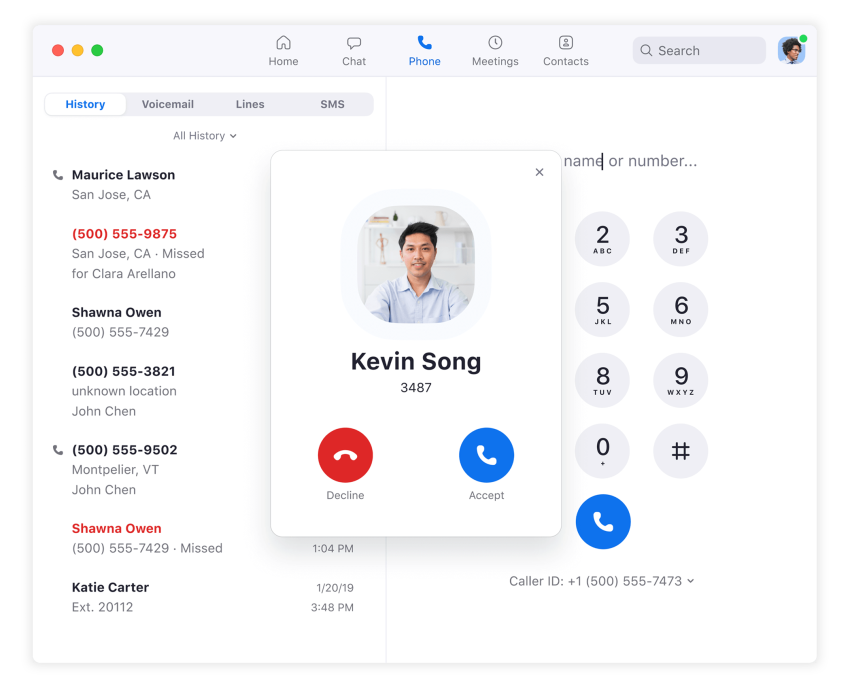
Zoom is well-known as the go-to video meeting and conferencing tool, but it’s also a cloud phone service provider. Zoom Phone is an enterprise-grade cloud phone system natively integrated with Zoom’s popular video conferencing capability.
What are some of its top features?
Zoom Phone offers more than 30 calling and phone administration features, including:
- Elevate to meeting: Go from a phone call to a full-feature Zoom meeting with video and/or screen sharing without making participants manually join.
- Call logs: View caller name, number, and call duration with timestamps so you can keep a detailed track of inbound and outbound calls.
- Call queues: Define automatic call distribution and call queue overflow rules to streamline how your calls are taken care of, even during the busiest times.
Zoom pricing plans
Zoom Phone offers three pricing plans:
- Metered pricing starts from $10/license/month, and includes metered international calling, 24×7 live chat and phone support, native mobile apps for iOS and Android, and some AI capabilities.
- Regional Unlimited costs $15/license/month and includes all the features of the metered, plus unlimited domestic calling.
- Global Select at $20/license/month includes all the standard features and enables businesses in over 40 countries and territories to pay one flat price per user for domestic calling plans.
How To Choose the Right Mitel Alternative Before the Deadline
Given the tight deadlines, your selection process must be efficient and focused.
1. Define your needs (Action by Jan 1st, 2026)
Before choosing a new provider, document your current setup.
- How many users do you have?
- Current phone number (DID) assignments and call routing
- Do you use call queues, auto attendants, or call recording?
Having this information ready is essential for a smooth migration.
2. Prioritize a partner with good migration support
The key challenge you face is the porting process, which can take over 6 weeks. Don’t just look at features; evaluate a provider’s ability to manage this transition. Ask potential vendors about their porting process, their support team’s experience, and their strategy for ensuring zero downtime.
3. Compare unified communication solutions
You are moving away from a platform because it’s no longer being invested in. Choose a forward-looking provider like Nextiva or similar that consolidates all your communication needs — voice, video, messaging, and customer support — into a single, actively developed platform. Read real user reviews on sites like G2 to compare solutions.
4. Get demos and make your choice
Schedule live demos with your top 2-3 choices. See the platform in action and ask specific questions about how they will handle your migration from MiCloud Connect. You should aim to sign a new agreement well before the April 30th termination notice deadline to give your new partner ample time to begin the transition.
Choose Nextiva — the Best-Practice Alternative To Mitel
When you’re facing a migration on a tight deadline, your choice of provider is more than just a product comparison; it’s about choosing the right partner. This is where Nextiva helps.
While RingCentral offers to migrate users to its own RingEX platform, this is your opportunity to evaluate the entire market and choose the solution that best fits your business needs for the long term.
Nextiva is the top choice for migrating Mitel customers because it directly addresses the biggest challenges of the transition:
- Eliminate porting anxiety: With a complex process that can take 6+ weeks, you need an expert in your corner. Nextiva’s dedicated onboarding and porting specialists manage the entire process, providing peace of mind and ensuring your numbers are transferred seamlessly.
- Secure your data: Don’t risk losing years of call recordings. Nextiva’s platform offers robust call recording features, ensuring your valuable data is safe and accessible from day one.
- Invest in innovation: Move from a legacy platform to a future-proof one. Nextiva’s unified system for calling, video, and team collaboration is constantly evolving, backed by Amazing Service® for support, implementation, and onboarding.
Customers love Nextiva — 93% of Nextiva customers would recommend its business phone service. On GetVoIP, Nextiva has a 4.6-star rating out of 5.

Don’t wait until the deadline is looming. Choose a partner that will make your transition from Mitel smooth, secure, and a great upgrade for your business.
Related: The Top RingCentral Alternatives for Business Phone Service
See what your phone system is missing.
Get more than a dial tone for your business.
Disclaimer: Mitel, Grasshopper, GoToConnect, Dialpad, Phone.com, Aircall, 8×8, OnSIP, Ooma Office, and Zoom have no relationship with Nextiva, Inc. and are the registered trademarks of their respective owners.
Frequently Asked Questions About Migrating from Mitel MiCloud Connect
Your service will be completely disconnected. According to RingCentral’s official notice, after 11:59 PM PST on that date, you will lose all access to your account, including the ability to make and receive calls. Any call recordings not already downloaded will be permanently lost. It’s critical to complete your migration before this date.
Yes. You have the right to port your phone numbers (both local and toll-free) to a new provider. This is a standard process, but it requires coordination. You must request a Customer Service Record (CSR) from RingCentral to begin the porting process with your new provider.
While some simple ports can be quick, it’s essential to plan for potential delays. RingCentral explicitly advises allowing up to 6 weeks for the transfer of your numbers, and it can take even longer for accounts with 100+ numbers. This is why it is critical to select your new provider and start the process by January 1st, 2026 recommended deadline.
Most likely, no. Mitel desk phones are proprietary and designed to work only with Mitel’s systems. When you switch to a new cloud VoIP service, you will almost certainly need new IP phones compatible with their service. Top providers like Nextiva offer a wide range of affordable, pre-configured VoIP desk phones from reputable brands like Poly and Yealink. They may even provide rental or free phone promotions.
No. RingCentral has stated that customers will not be liable for any Early Termination Fees due to the platform’s End of Life. Any service fees you may have prepaid for periods after the EoL date will be refunded. This removes a major financial barrier to switching.
Beyond features and price, the most critical factor is proven migration support. Given the tight deadlines and the complexity of porting, you need a partner with a dedicated onboarding and porting team that will manage the process for you. A provider who just gives you instructions and leaves you to handle it adds unnecessary risk to your business operations.

















 VoIP
VoIP 








